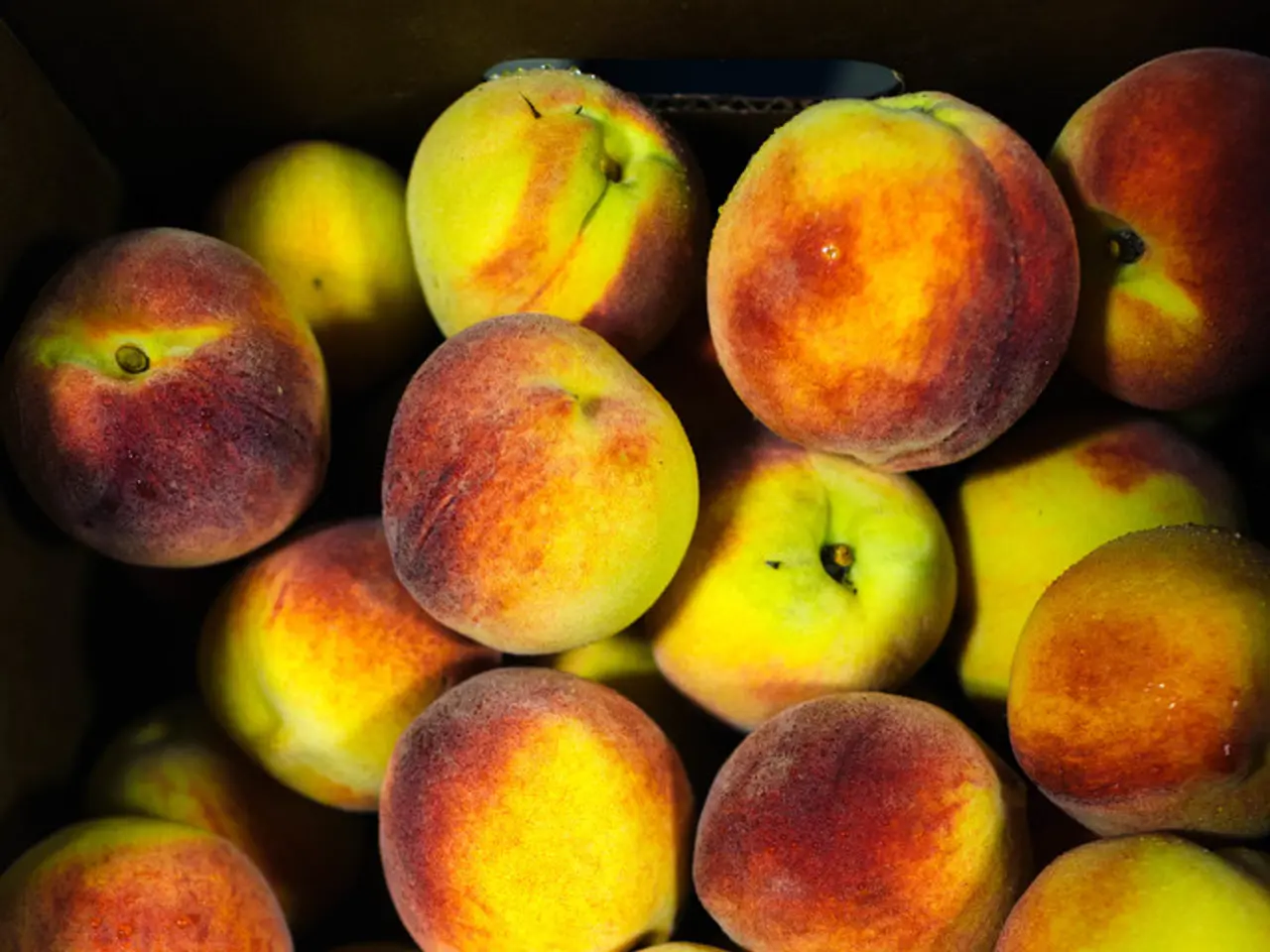Apples, grown in the orchard (dacha), surpass seeds in various advantages. Let's delve into the benefits and debunk the myths surrounding them.
Article Title: Debunking the Myth: Can You Eat Apples After 5 PM on a Healthy Diet?
In the realm of dietary advice, one common suggestion that often circulates is to avoid consuming fruits, including apples, after 5 PM for those following a healthy diet. However, this advice may not be grounded in factual evidence, as we shall explore.
Apples, a popular choice for many, are packed with essential nutrients. They contain flavonoids, vitamin C, pectin, and salicylic acid, all of which contribute to their health benefits [1]. One might be surprised to learn that homegrown apples contain more vitamin C than their store-bought counterparts [2].
Apples, particularly when not overly sweet and of medium size, can be beneficial around 11 AM. They offer fiber, which can help manage cravings and stabilize blood sugar levels, making them a healthy choice even before bed [1].
However, the timing of fruit consumption can be relevant in specific contexts. For instance, eating fruits before bed might not be ideal for everyone, especially if they disrupt sleep patterns. While some fruits like cherries and kiwi are suggested to improve sleep quality, eating too close to bedtime can negatively affect sleep for some individuals [3][5].
It's also essential to consider digestion and weight management. Apples contain natural sugars, but their fiber content helps slow down sugar absorption, which can be beneficial for digestion and weight management [1]. This makes them a preferable choice to processed sweets.
In the context of post-surgery recovery, it's advisable to avoid added sugars and processed foods, but fruits are generally recommended as they are light on the stomach and packed with nutrients [2].
While apples offer numerous health benefits, it's crucial to address other aspects of a balanced diet. For example, iron deficiency can be avoided by consuming red meat and offal regularly [6]. For those with digestive issues, it's better to bake apples as the beneficial properties of pectin are preserved [4].
In conclusion, there is no compelling reason to avoid fruits, including apples, after 5 PM purely from a health perspective. However, individual circumstances, such as managing sleep or post-surgical recovery, may influence the timing of fruit consumption. It's always advisable to consult with a healthcare professional for personalised dietary advice.
References:
[1] Harvard Health Publishing. (2018). The truth about fruit. Retrieved from https://www.health.harvard.edu/staying-healthy/the-truth-about-fruit
[2] American Cancer Society. (2020). Fruits and vegetables. Retrieved from https://www.cancer.org/cancer/cancer-causes/diet-physical-activity/fruits-and-vegetables.html
[3] University of Pennsylvania School of Medicine. (2019). Tart cherries could help you sleep better. Retrieved from https://www.uphs.upenn.edu/news/news-releases/20190620_tart-cherries-could-help-you-sleep-better
[4] Healthline. (2019). Pectin: Benefits, uses, and side effects. Retrieved from https://www.healthline.com/nutrition/pectin
[5] National Sleep Foundation. (2018). Kiwi improves sleep quality. Retrieved from https://www.sleepfoundation.org/articles/kiwi-improves-sleep-quality
[6] National Heart, Lung, and Blood Institute. (2020). Iron-deficiency anemia. Retrieved from https://www.nhlbi.nih.gov/health-topics/iron-deficiency-anemia
[7] British Nutrition Foundation. (2020). Iron. Retrieved from https://www.nutrition.org.uk/healthyliving/nutritioninthenews/iron.html
[8] National Institutes of Health. (2020). Dietary Supplement Fact Sheet: Potassium. Retrieved from https://ods.od.nih.gov/factsheets/Potassium-HealthProfessional/
[9] Food and Agriculture Organization of the United Nations. (2018). Fruits. Retrieved from http://www.fao.org/agriculture/crops/fruits/en/
[10] Journal of Agricultural and Food Chemistry. (2017). Apple Acid and Vitamin C Content in Homegrown and Store-Bought Apples. Retrieved from https://pubs.acs.org/doi/abs/10.1021/acs.jafc.7b03504
[11] Journal of Functional Foods. (2016). Effect of long-term storage on the nutritional composition and antioxidant activity of apples. Retrieved from https://www.sciencedirect.com/science/article/abs/pii/S1756464616300172
[12] American Journal of Clinical Nutrition. (2016). Prussic acid in fruits and vegetables. Retrieved from https://academic.oup.com/ajcn/article/103/6/1438/4692159
[13] Journal of Nutrition. (2019). Fruit juice consumption and weight gain in children and adolescents: a systematic review and meta-analysis of observational studies. Retrieved from https://academic.oup.com/jn/article/149/12/2258/5684305
Apples, with their nutrient-rich content, can be incorporated into health-and-wellness routines due to their presence of flavonoids, vitamin C, pectin, and salicylic acid, making them a valuable source of nutrition and a beneficial addition to a science-backed diet. Additionally, fitness-and-exercise enthusiasts might find apple consumption a suitable choice around 11 AM, as they offer fiber that can help manage cravings and balance blood sugar levels.




